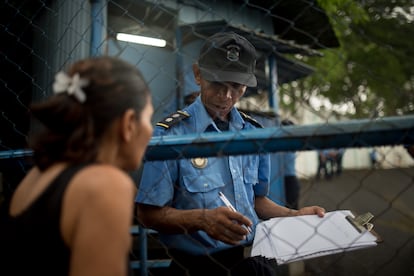Speedy show trials and daily check-ins with the police are the latest form of repression in Nicaragua
Opposition groups denounce recent arrests of 18 dissidents and an alleged murder


In the latest wave of repression in Nicaragua, 18 people were arrested by the police between May 12 and 14. In trials merely for show, those detained were hastily prosecuted for the political crimes of “conspiracy to undermine the national integrity and spread disinformation.”
In the past, political prisoners were often locked up for months or years to await charges and trials. But in early May, the Ortega-Murillo regime switched tactics and did not imprison its most recent detainees. Instead, the 57 people arrested were quickly tried and convicted in a matter of hours, with no legal representation. They were then released from detention but are required to check in every day at police stations around the country.
According to the Twitter feed of Monitoreo Azul y Blanco [Blue and White Monitor], a Nicaraguan human rights watchdog organization, the latest arrests happened in the departments of Rivas, Managua, Masaya, Granada, Chinandega, Chontales, Madriz, Boaco, as well as in the two autonomous regions of the Nicaraguan Caribbean. One detainee is Juan Carlos Márquez, a member of the Alianza Universitaria Nicaragüense (AUN) student organization. The young man was grabbed by the police when he was returning home from mass in Nandaime (Granada Department).
Dr. José Luís Borgen, a member of the Nicaraguan Medical Unit, was arrested in Managua. The doctor had been summoned by prosecutors in July 2021 to testify against several other doctors who spoke out against government negligence during the Covid-19 pandemic. Alejandro Vélez Brenes, a public notary, was also arrested in the capital. In Masaya, 40-minutes to the south, Yolanda González Escobar was arrested by police despite precautionary protective measures granted by the Inter-American Commission on Human Rights (IACHR) after her house was raided twice.
“Fortifying the terror state”
An opposition organization called Unidad Nacional Azul y Blanco (National Blue and White Unity) said of the arrests: “All these actions by the dictatorship, as well as the cancellation of the professional licenses of 26 lawyers and notaries, are fortifying the terror state and weakening the citizenry through daily, flagrant human rights violations.”
Unidad Nacional Azul y Blanco also claims that dozens of Nicaraguan citizens have been arrested since May 3 after “illegal searches of homes, seizure of electronic devices and several confiscations of personal property and money... Shortly thereafter, police threatened several Nicaraguans and relatives of exiled citizens, and told them they are police targets.”
The political analysts consulted by EL PAÍS (who wished to remain anonymous) say that this new tactic is another manifestation of the “Sandinista dictatorship’s repression, which holds political prisoners to use as bargaining chips and quash outbreaks of opposition in the country.”
Douglas Castro, a Nicaraguan sociologist in exile, told the Divergentes digital news outlet: “This requirement to check in with the police every day is intimidation aimed at breaking up opposition networks, many of whom then decide to go into exile. It’s a rational calculation by the regime to mitigate the political cost of imprisoning more citizens.”
EL PAÍS learned that several people arrested and sentenced in May have already gone into exile in Costa Rica to avoid the daily police check-ins. “Staying [in Nicaragua] means being in constant limbo, because once convicted, you don’t know when the police will decide to lock you up in El Chipote [prison],” said a Nicaraguan who recently arrived in San José (Costa Rica).
“Their goal is to eliminate all opposition inside Nicaragua. Personally, I think that’s impossible. There will always be some kind of underground resistance or opposition, even if it’s not out in the open,” said Douglas Castro.
Former Sandinista denounces his nephew’s alleged murder
Marlon Saenz is a Sandinista dissident and one of the 222 political prisoners exiled to the United States earlier this year. He claims that his nephew, Erick Centeno Ríos, died in police custody after the latest raids. Saenz posted videos posted on Facebook showing the violent arrest of his nephew on May 13 by police officers on Corn Island (Nicaragua’s Caribbean coast). “This was the arrest and murder of my nephew, Erick Centeno Ríos,” wrote Saenz. “He was later found dead.”
At least five police officers pulled Centeno from his truck, forced him to the ground, and beat him. Saenz said his nephew’s body was sent to his hometown of Condega (Esteli Department) and buried on May 15.
Sign up for our weekly newsletter to get more English-language news coverage from EL PAÍS USA Edition
Tu suscripción se está usando en otro dispositivo
¿Quieres añadir otro usuario a tu suscripción?
Si continúas leyendo en este dispositivo, no se podrá leer en el otro.
FlechaTu suscripción se está usando en otro dispositivo y solo puedes acceder a EL PAÍS desde un dispositivo a la vez.
Si quieres compartir tu cuenta, cambia tu suscripción a la modalidad Premium, así podrás añadir otro usuario. Cada uno accederá con su propia cuenta de email, lo que os permitirá personalizar vuestra experiencia en EL PAÍS.
¿Tienes una suscripción de empresa? Accede aquí para contratar más cuentas.
En el caso de no saber quién está usando tu cuenta, te recomendamos cambiar tu contraseña aquí.
Si decides continuar compartiendo tu cuenta, este mensaje se mostrará en tu dispositivo y en el de la otra persona que está usando tu cuenta de forma indefinida, afectando a tu experiencia de lectura. Puedes consultar aquí los términos y condiciones de la suscripción digital.








































